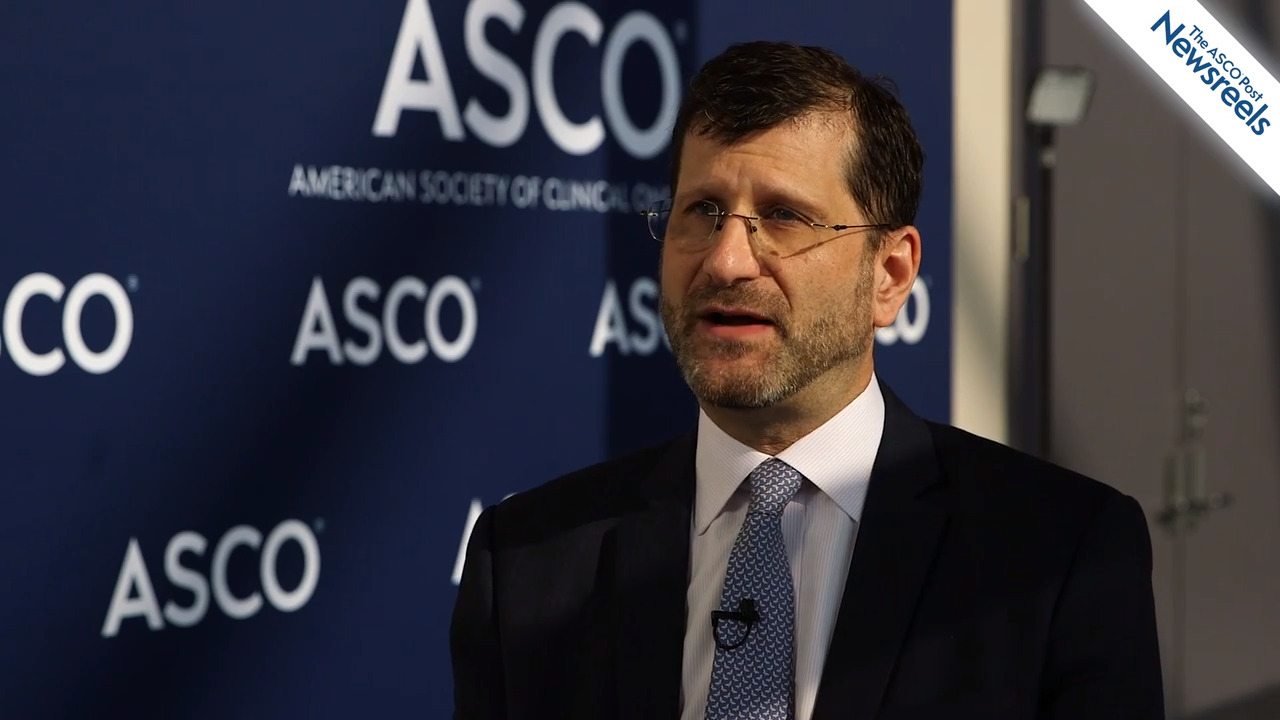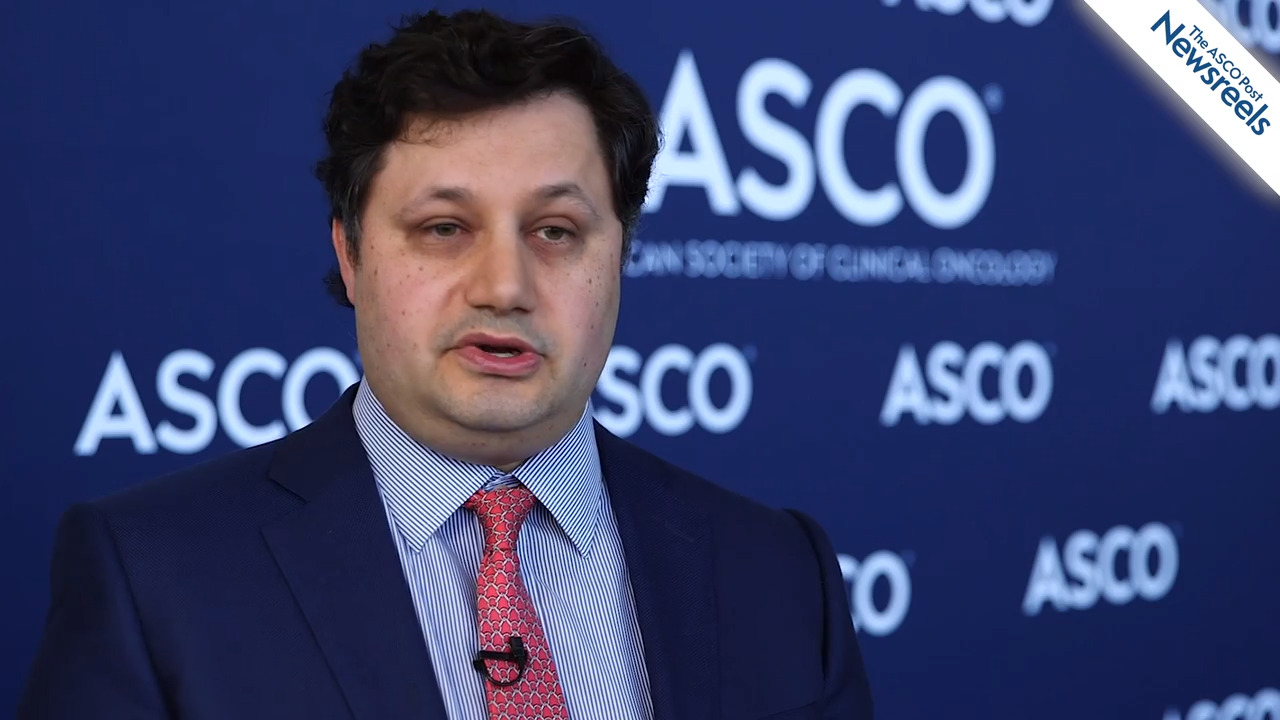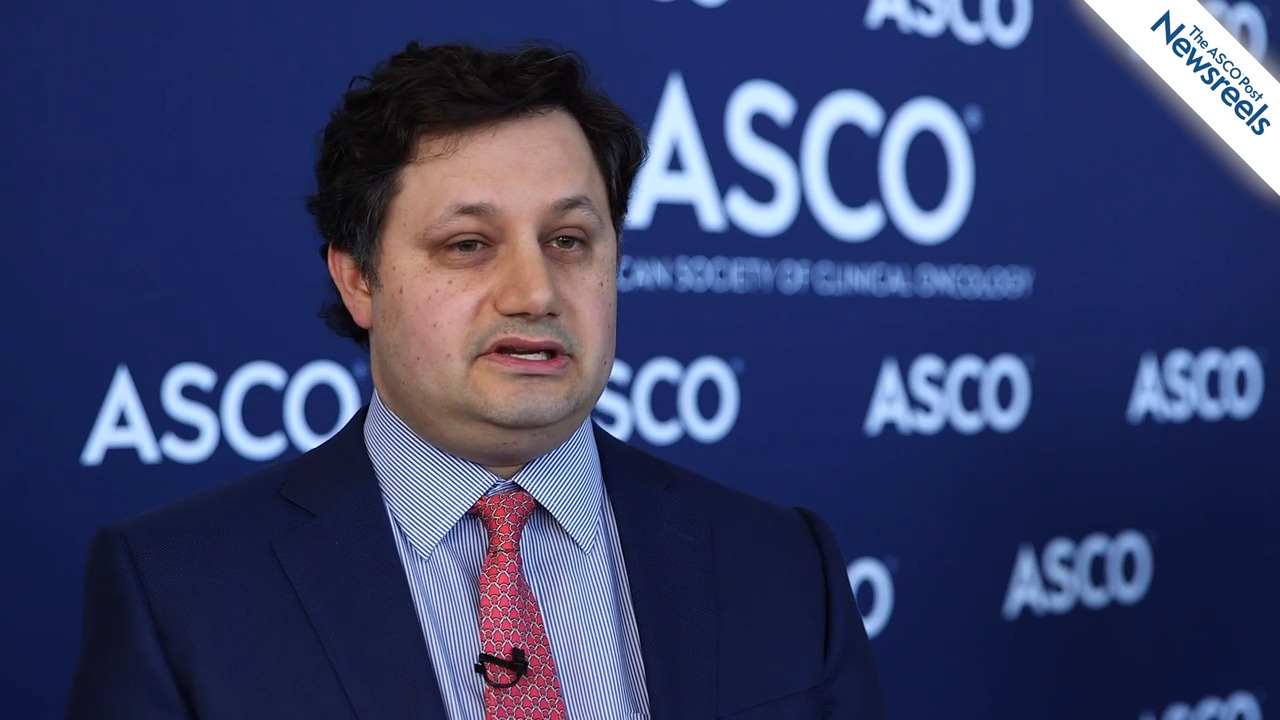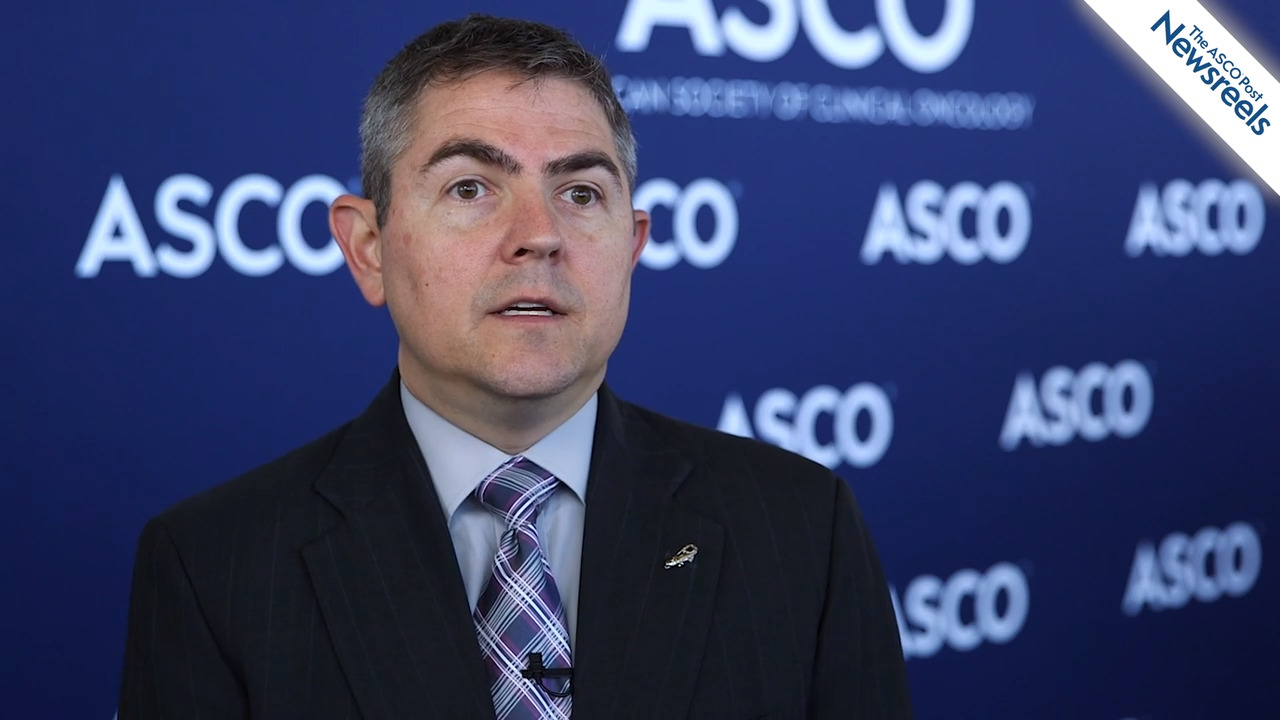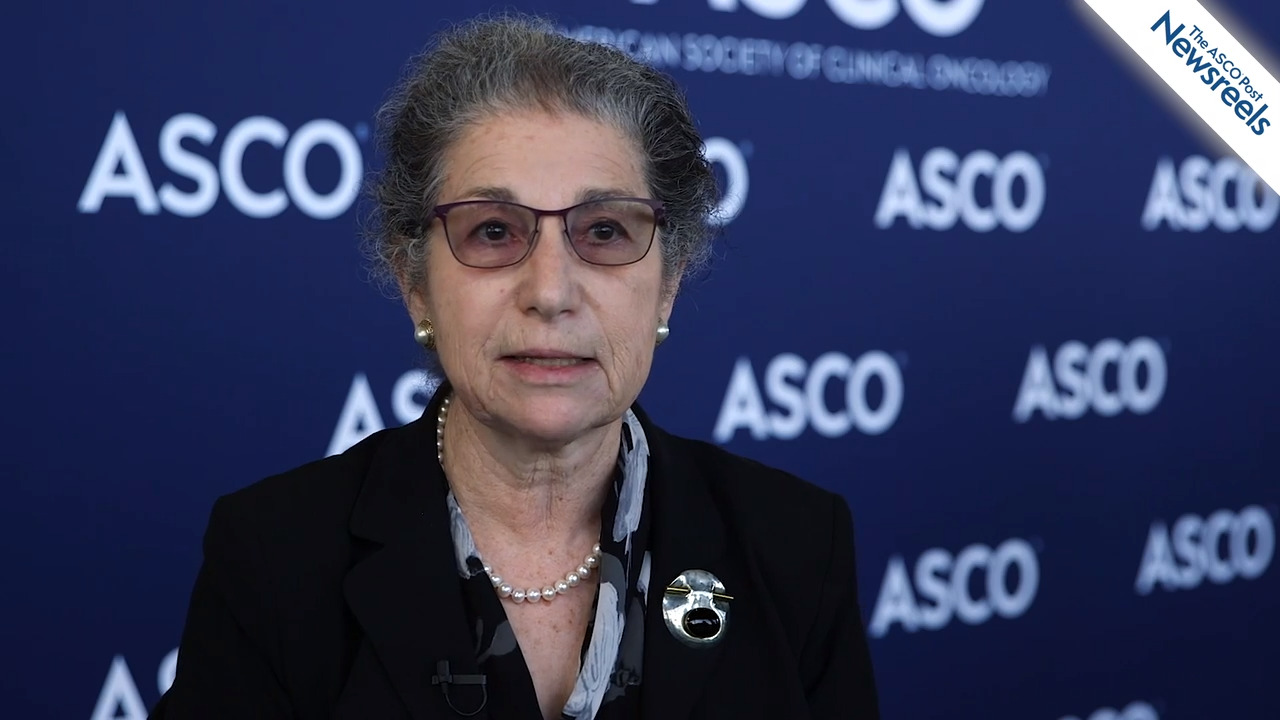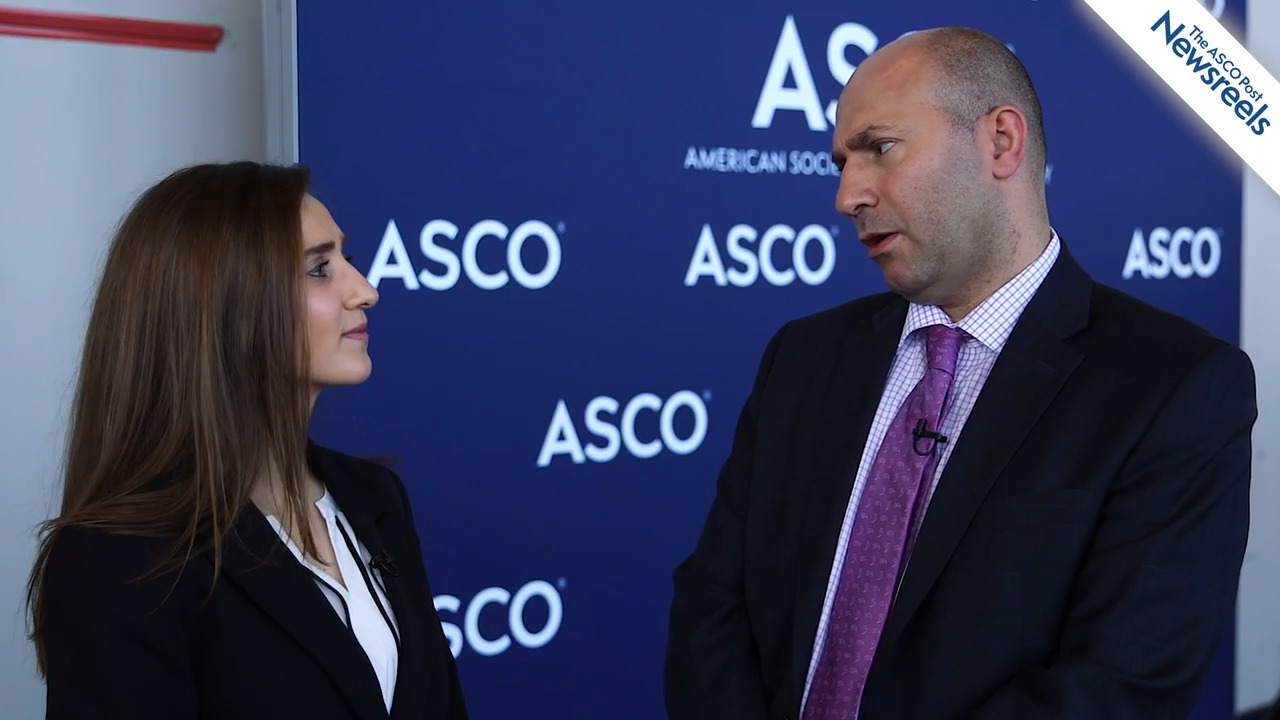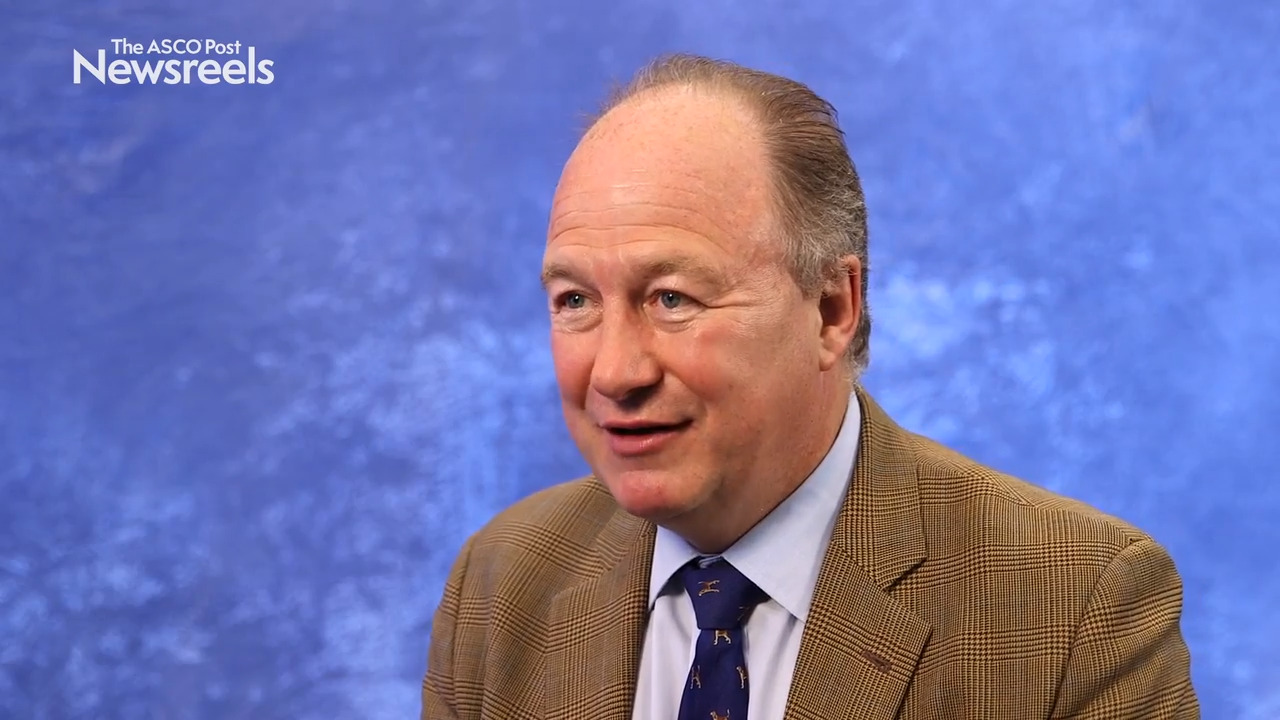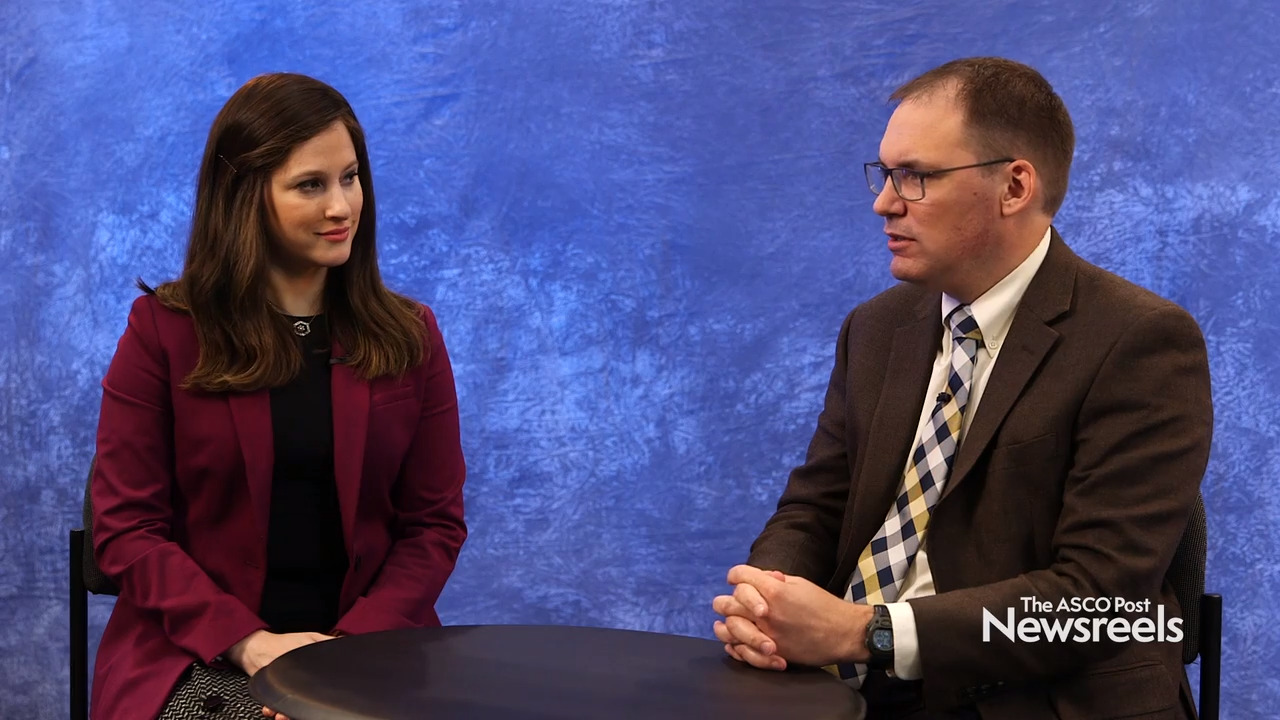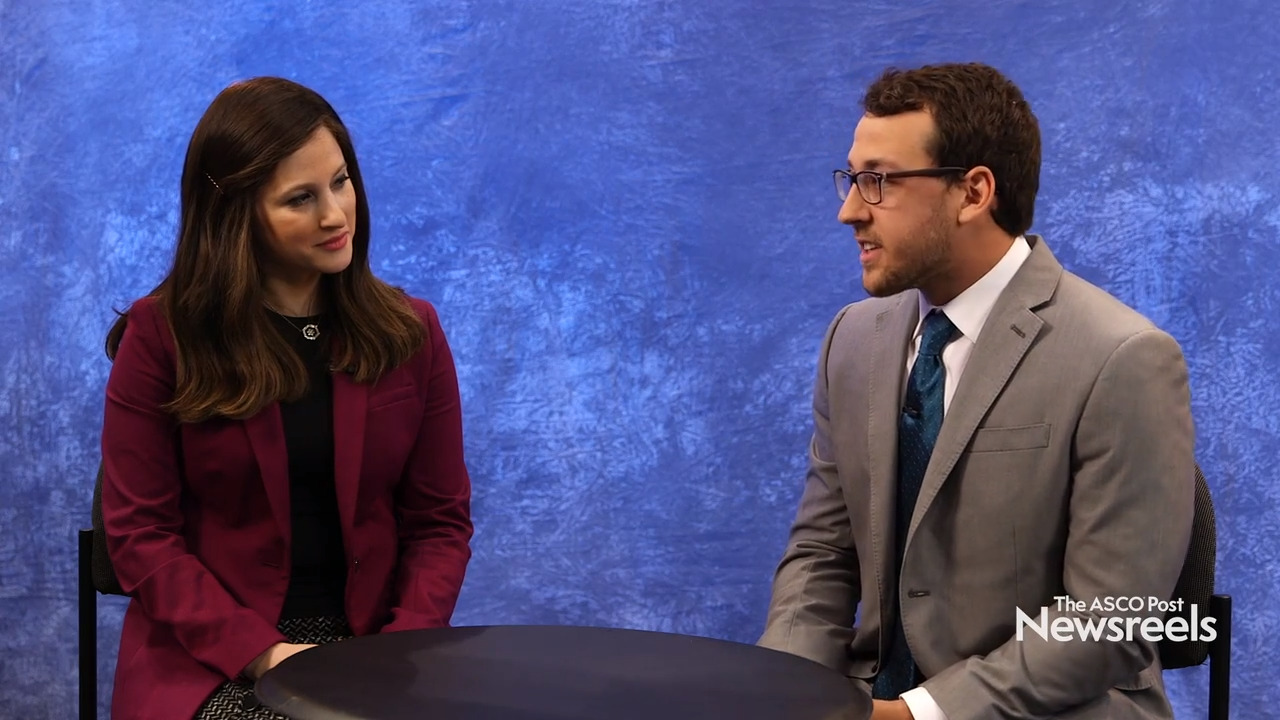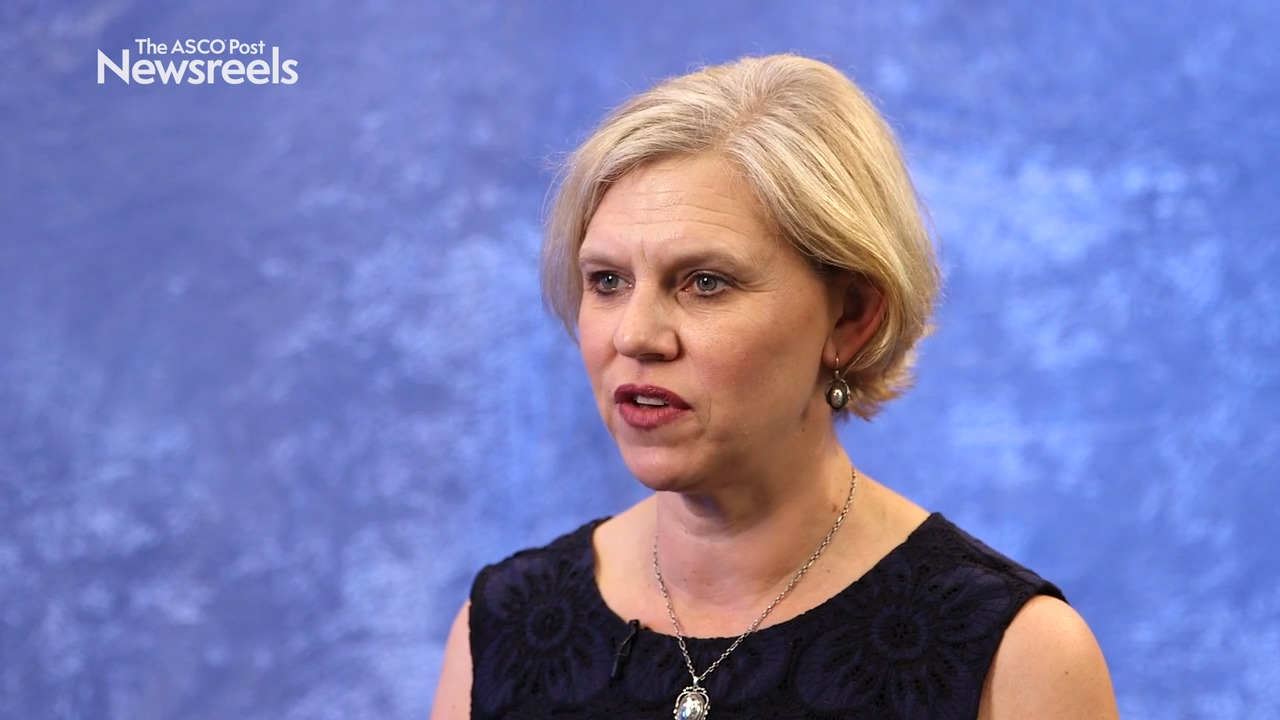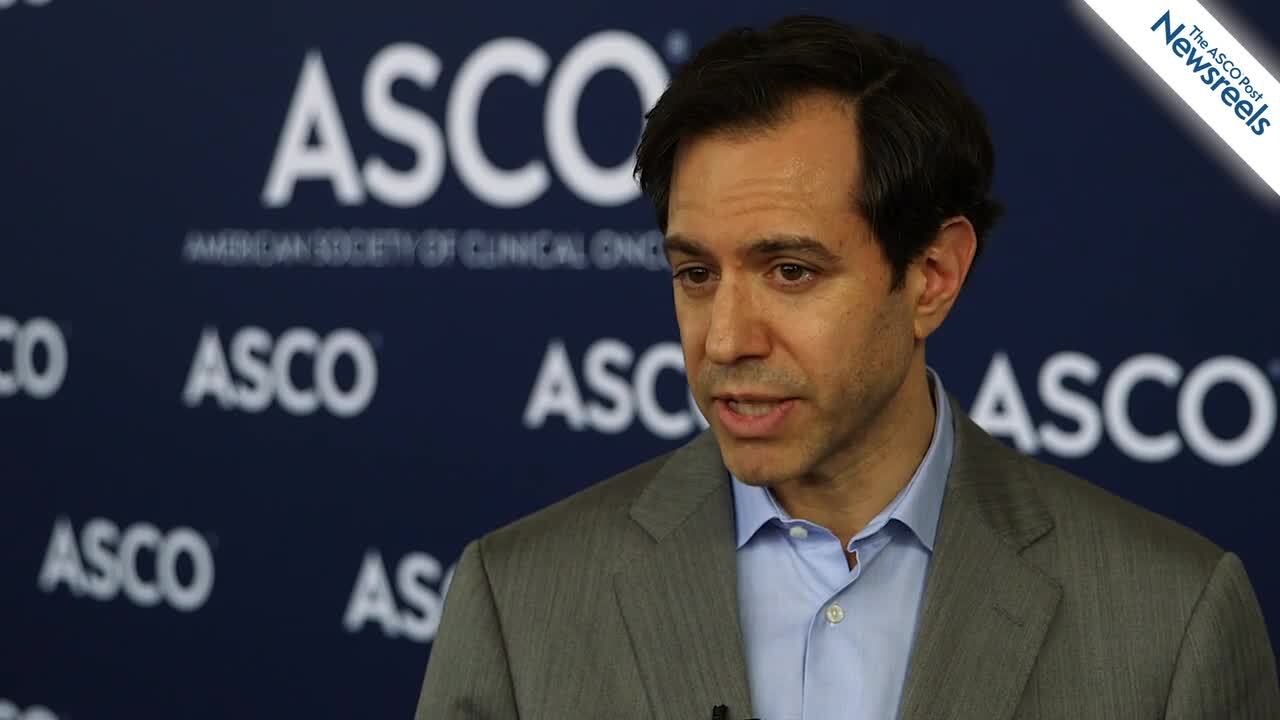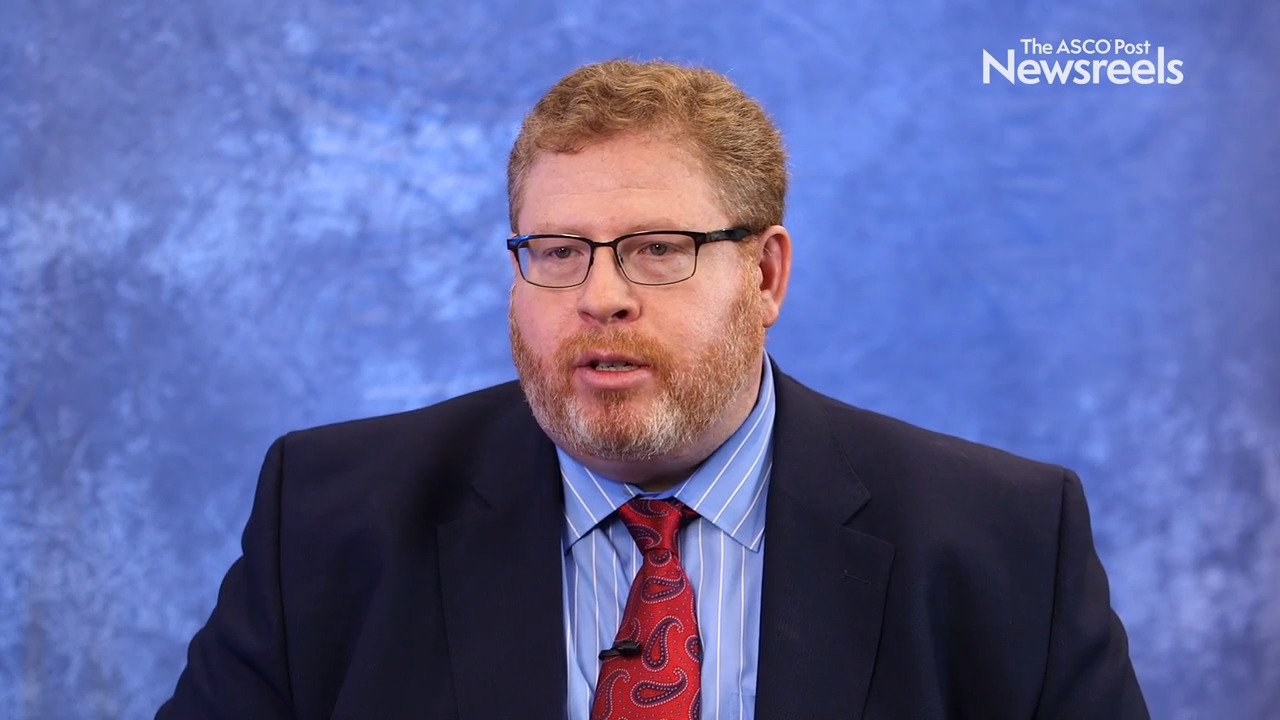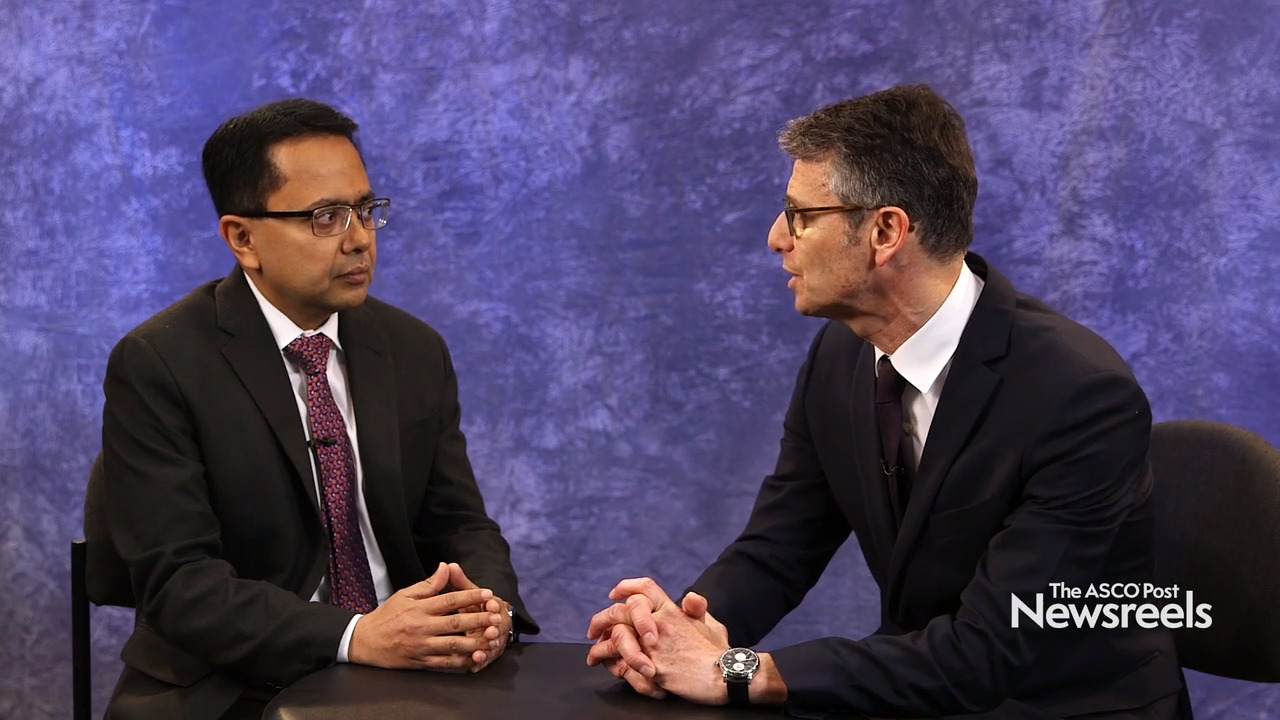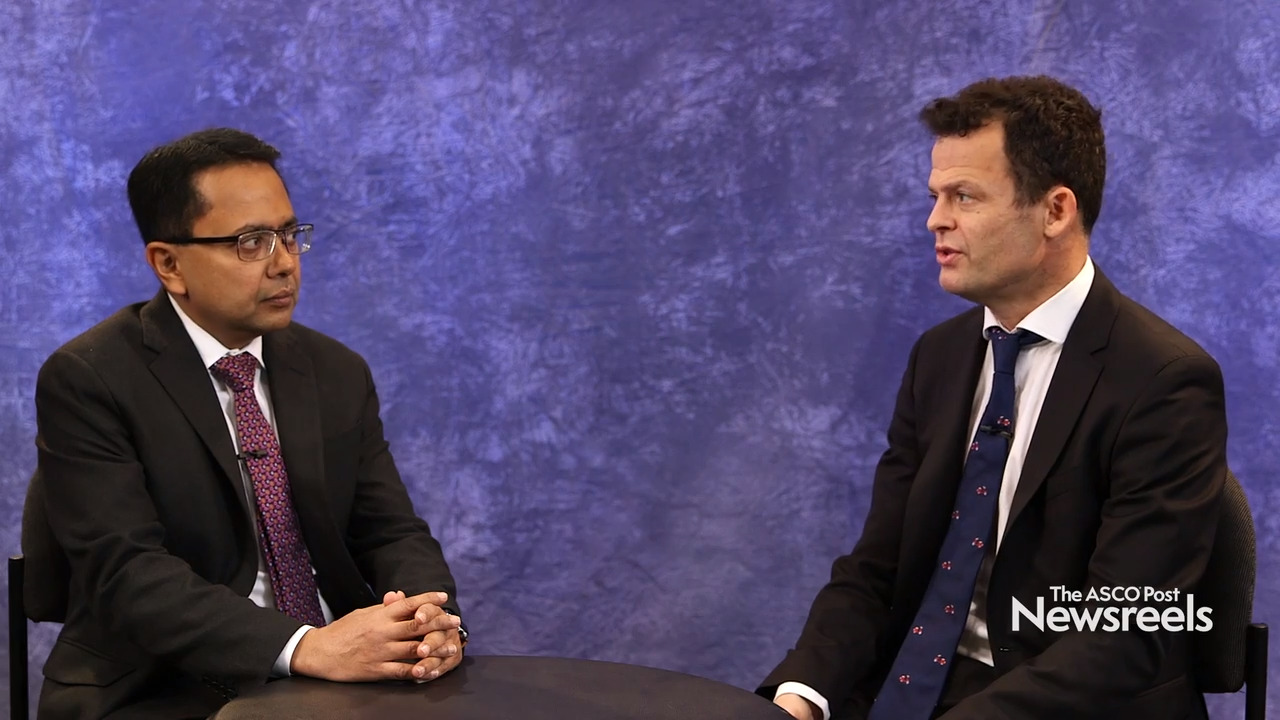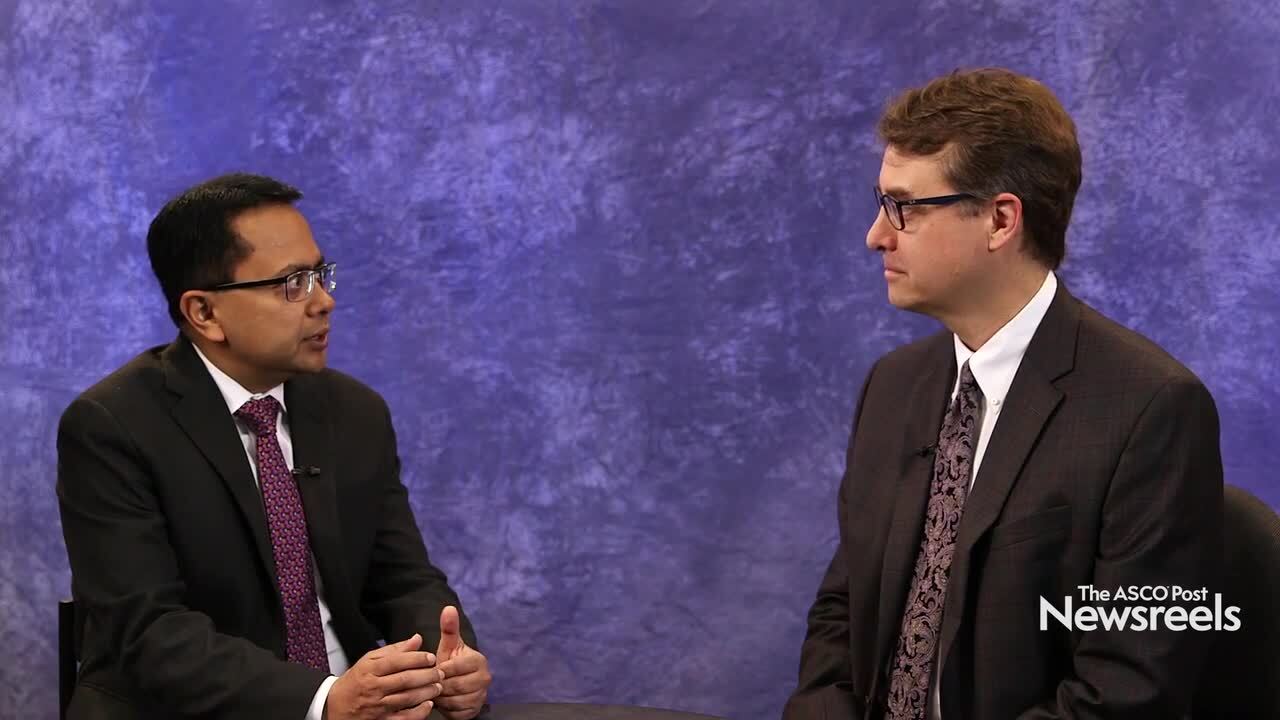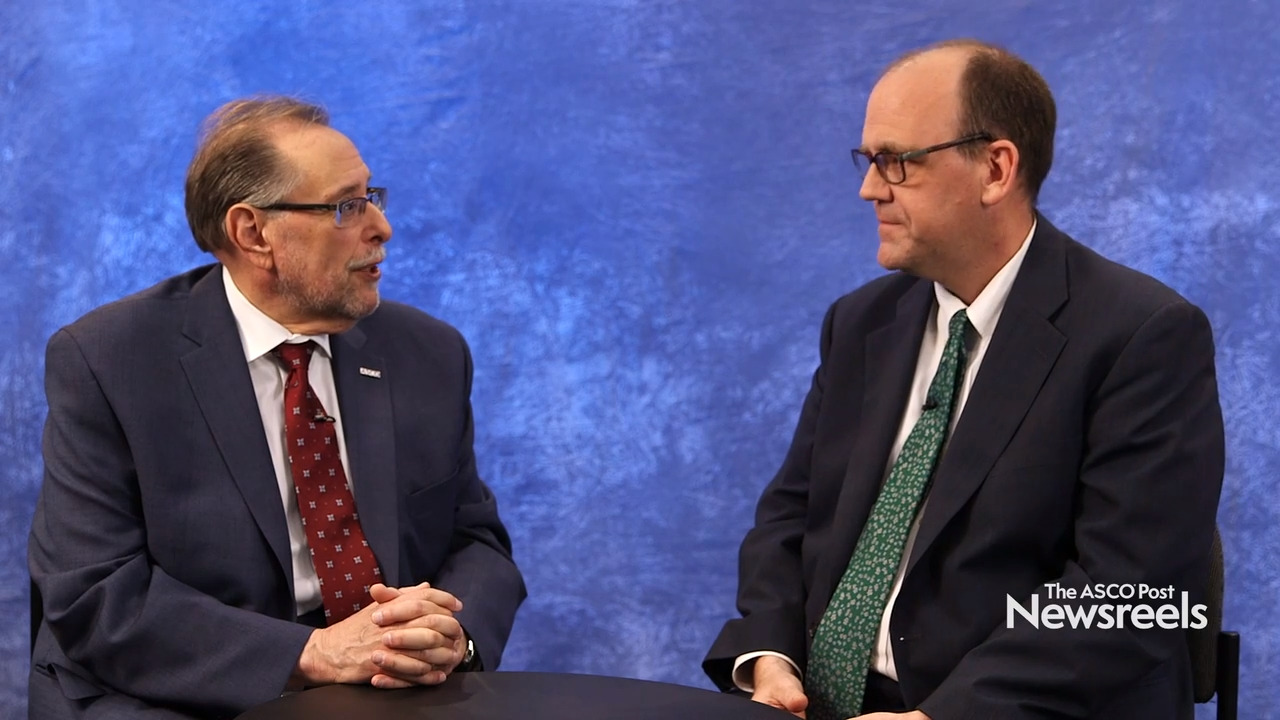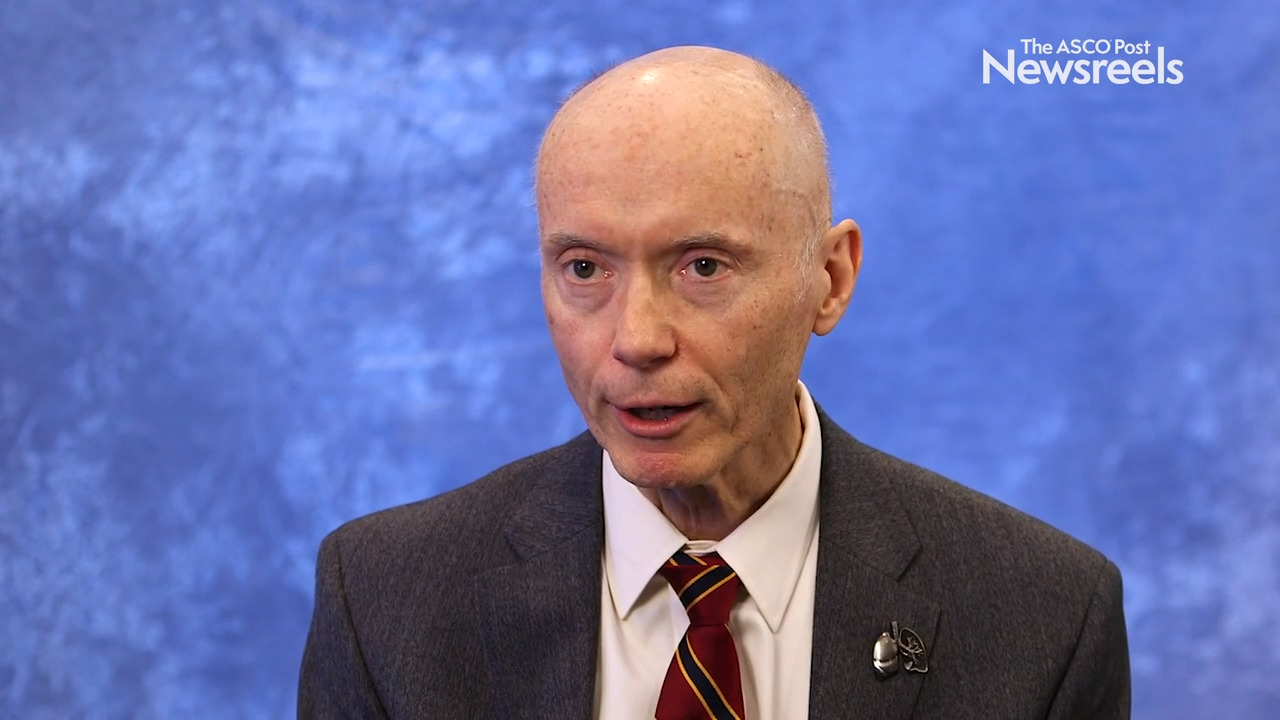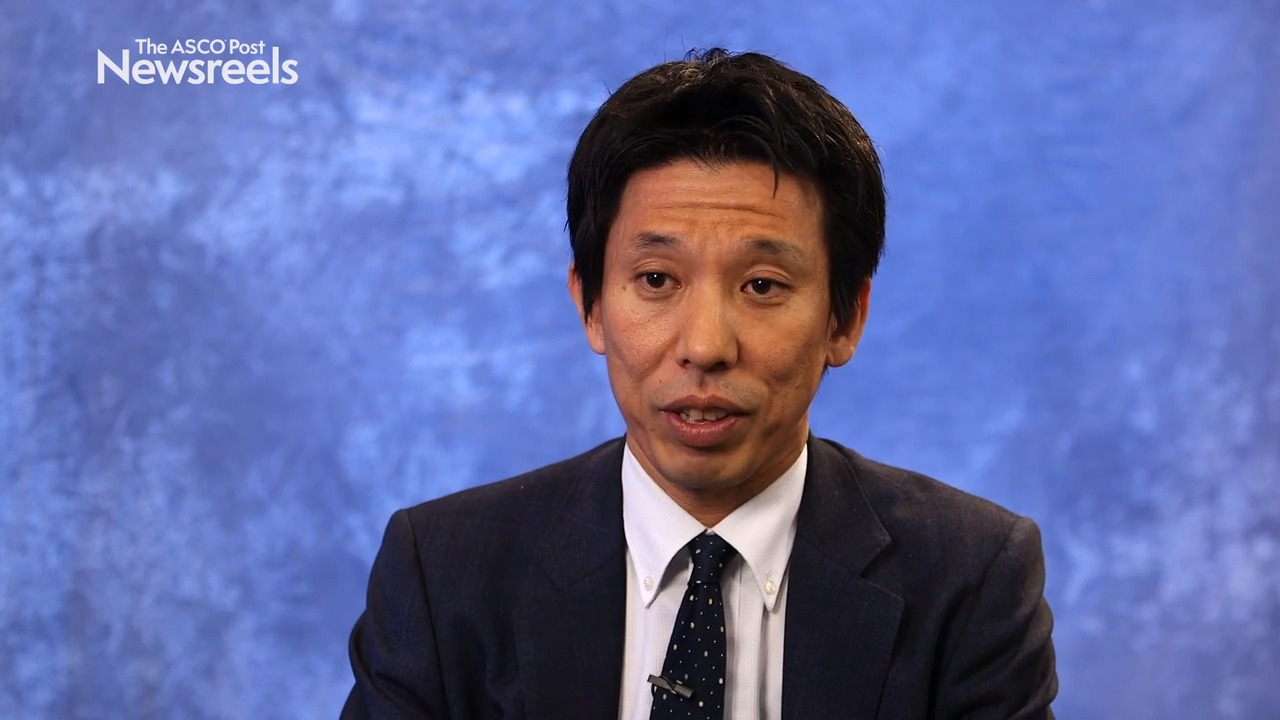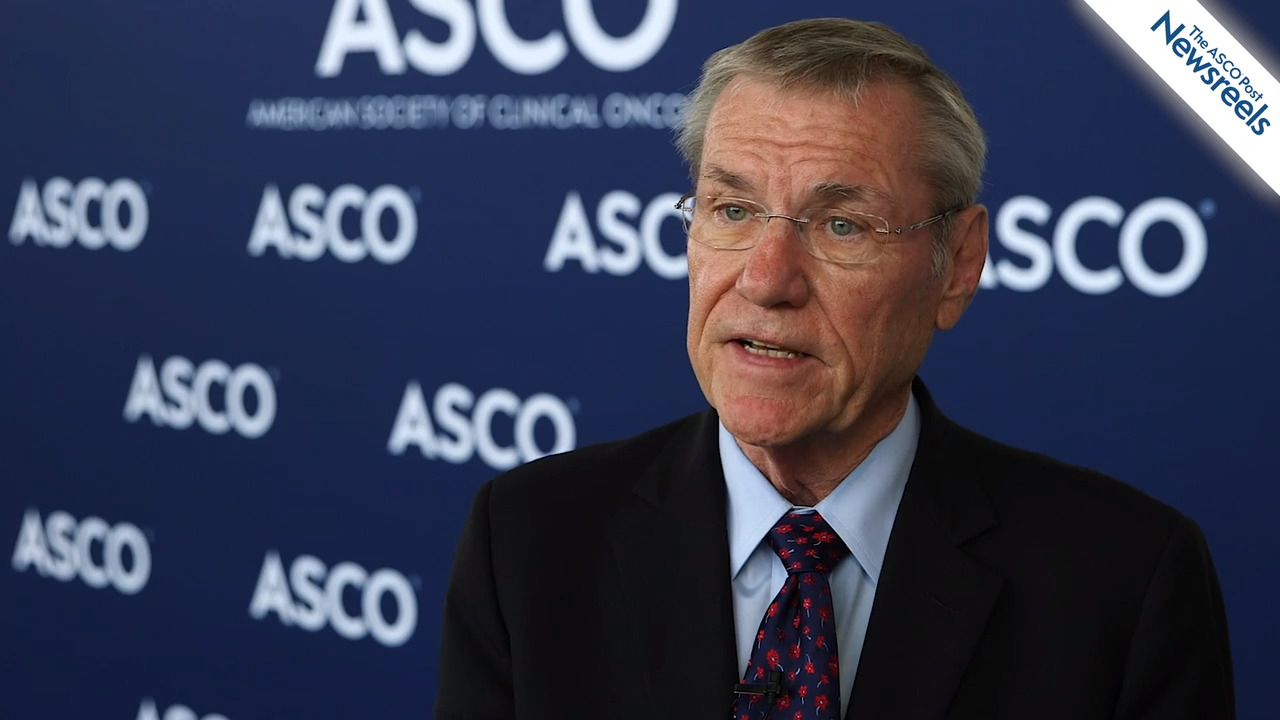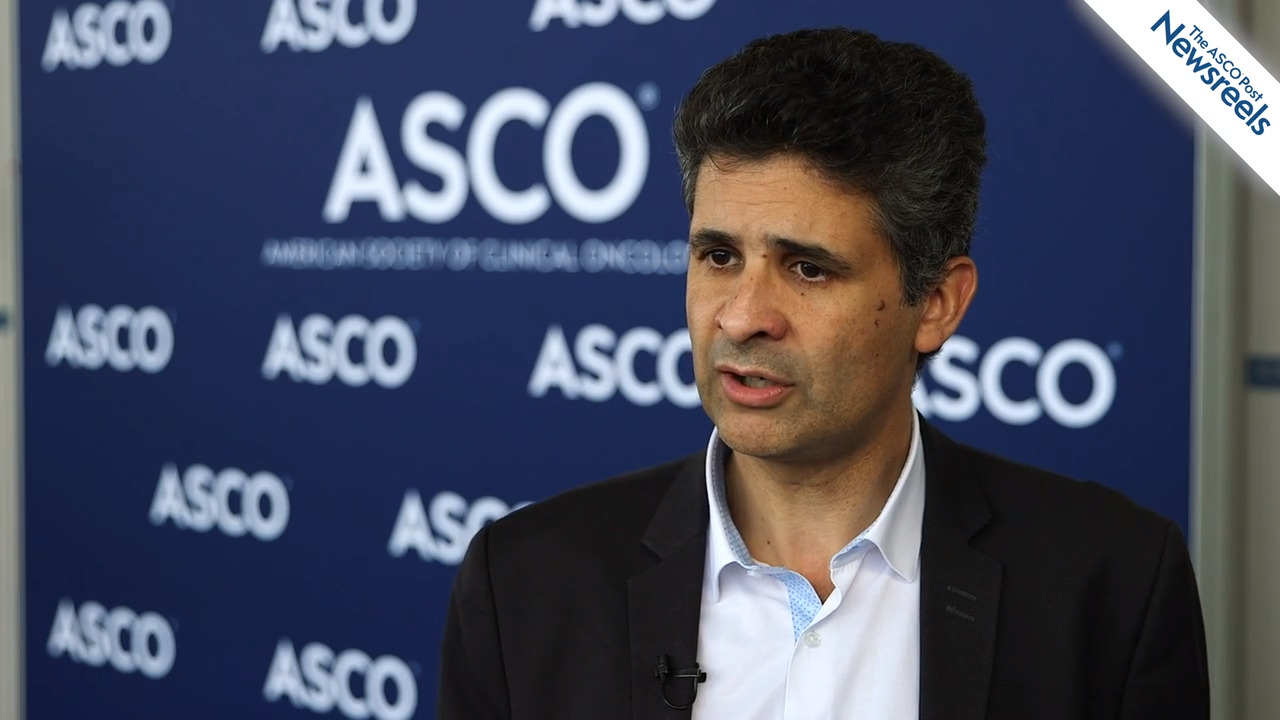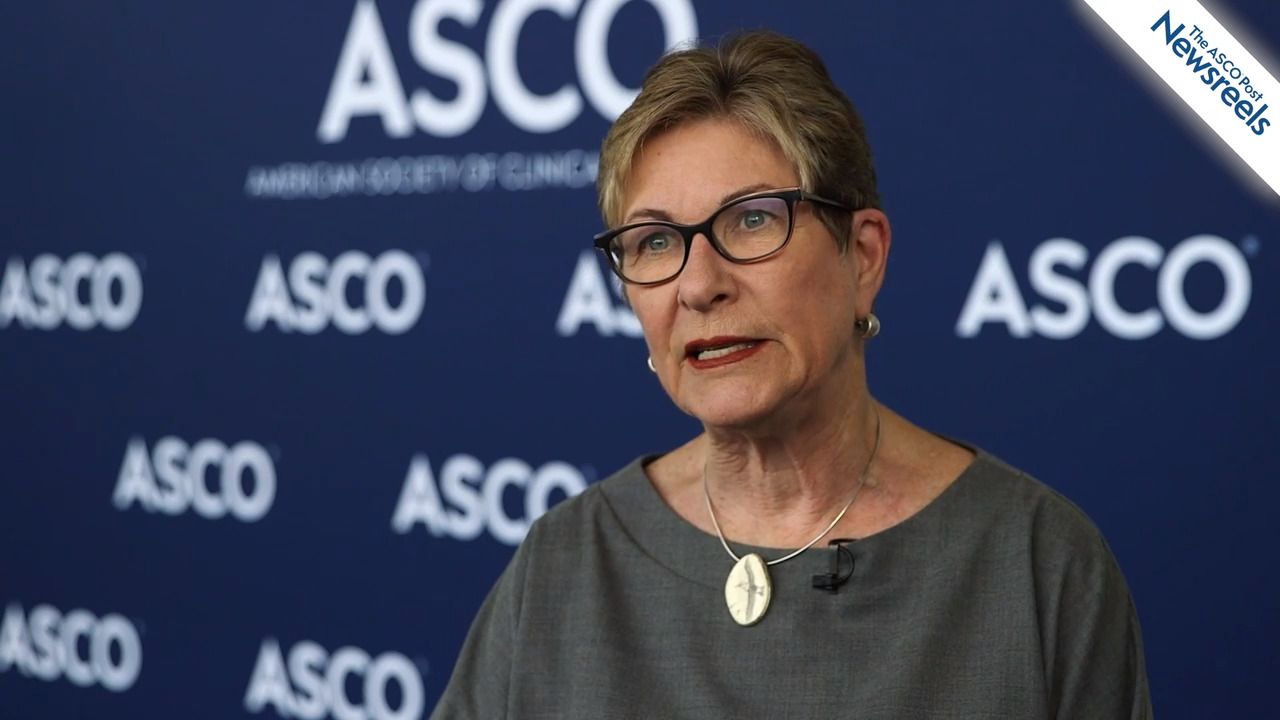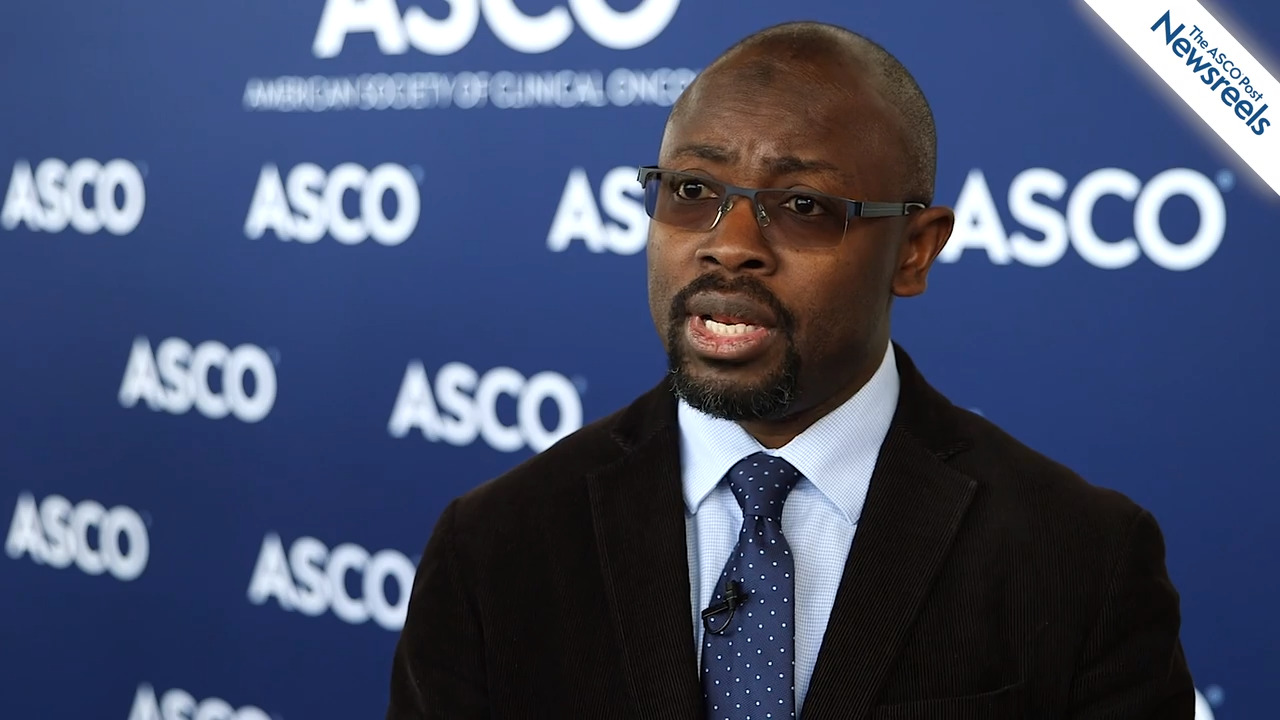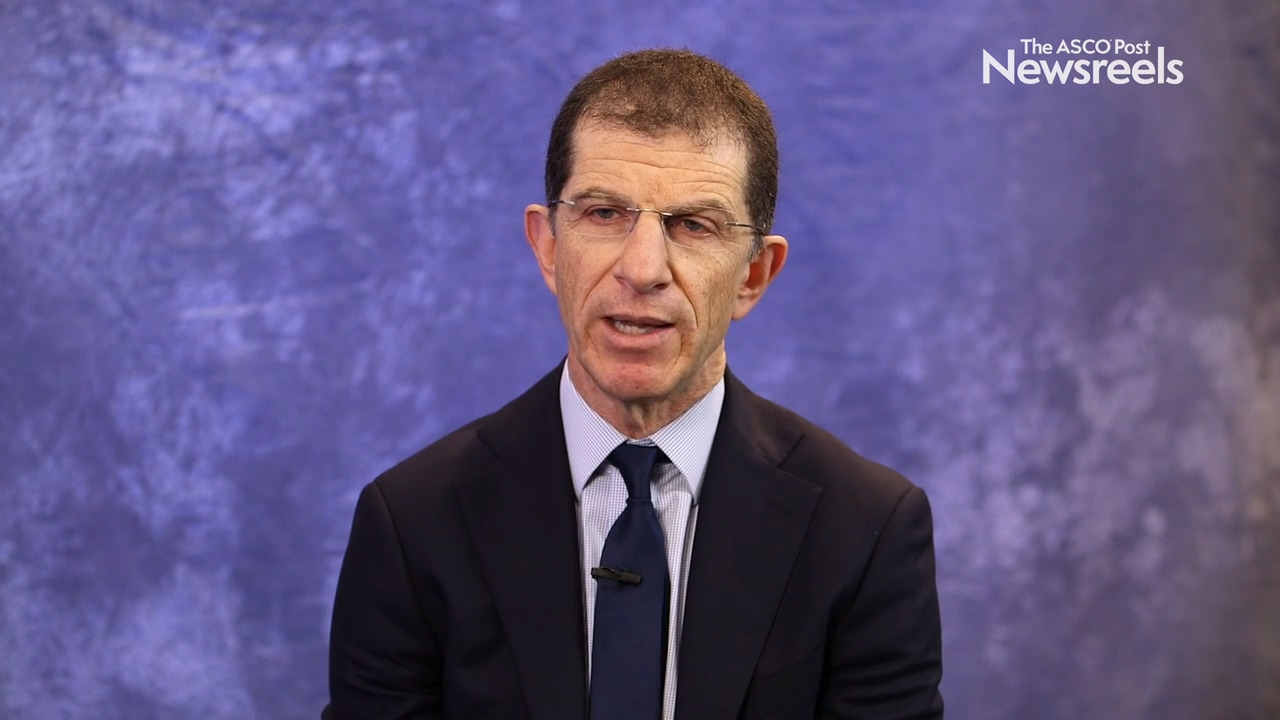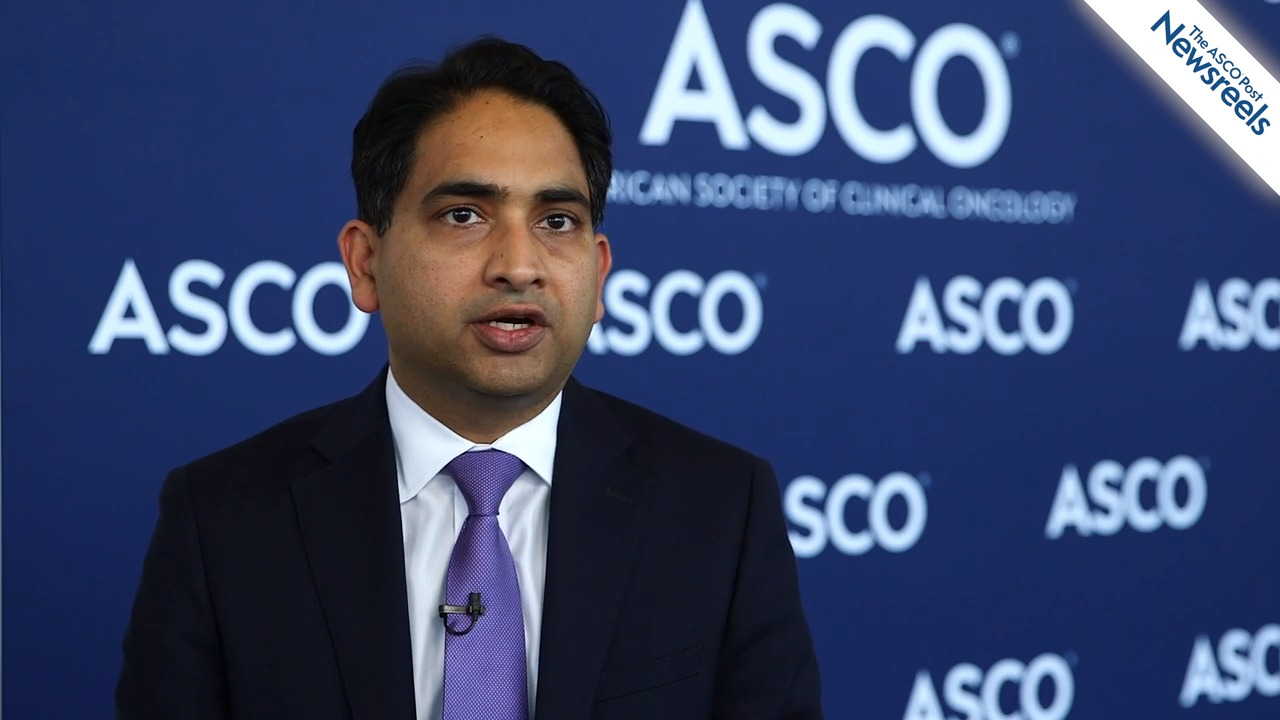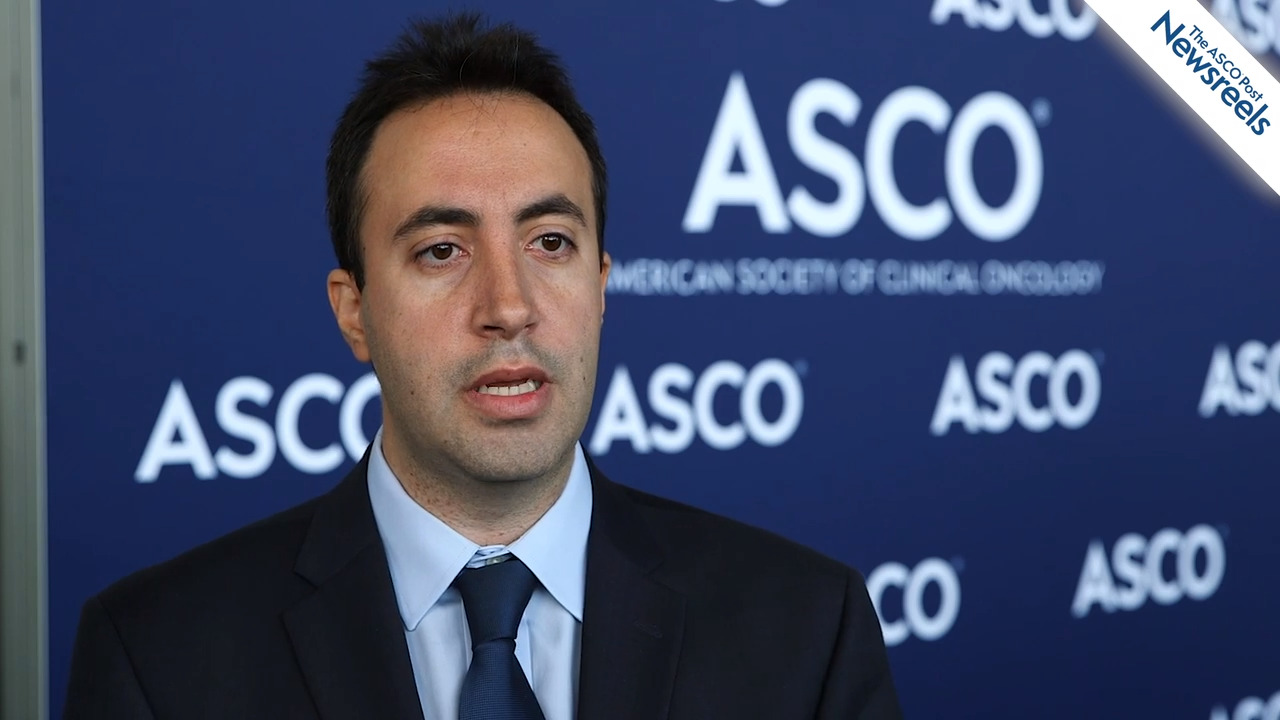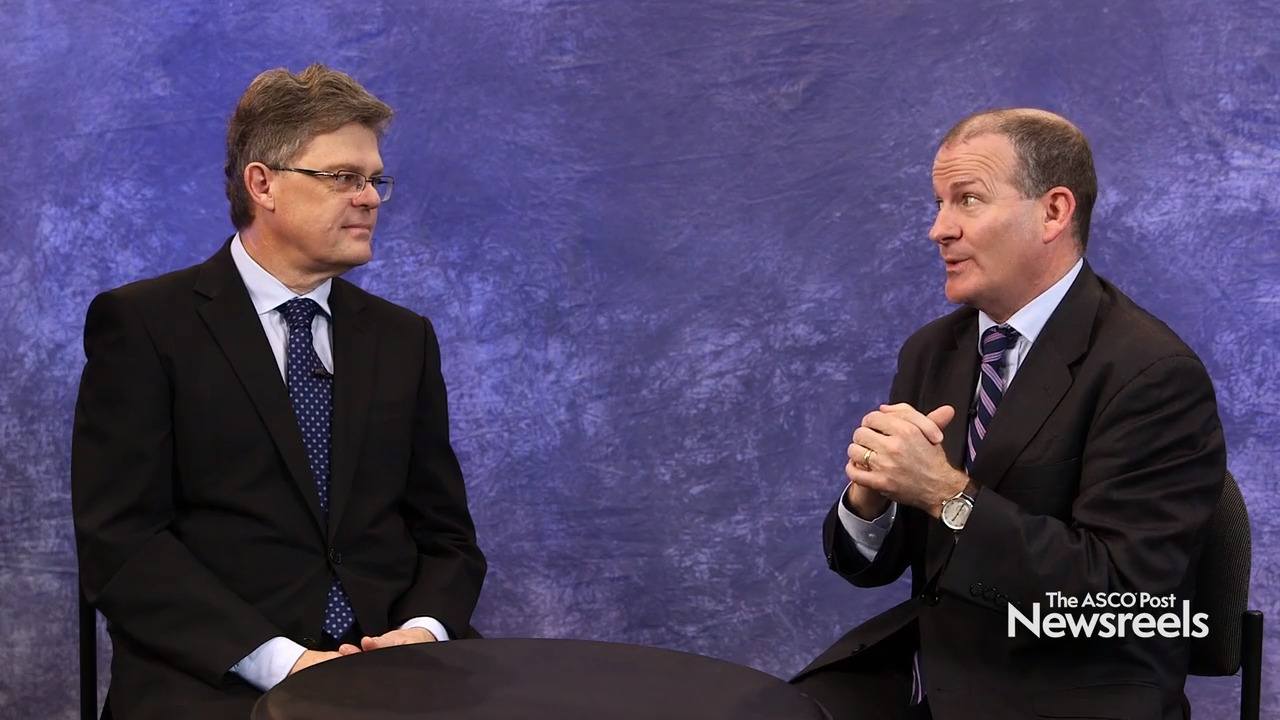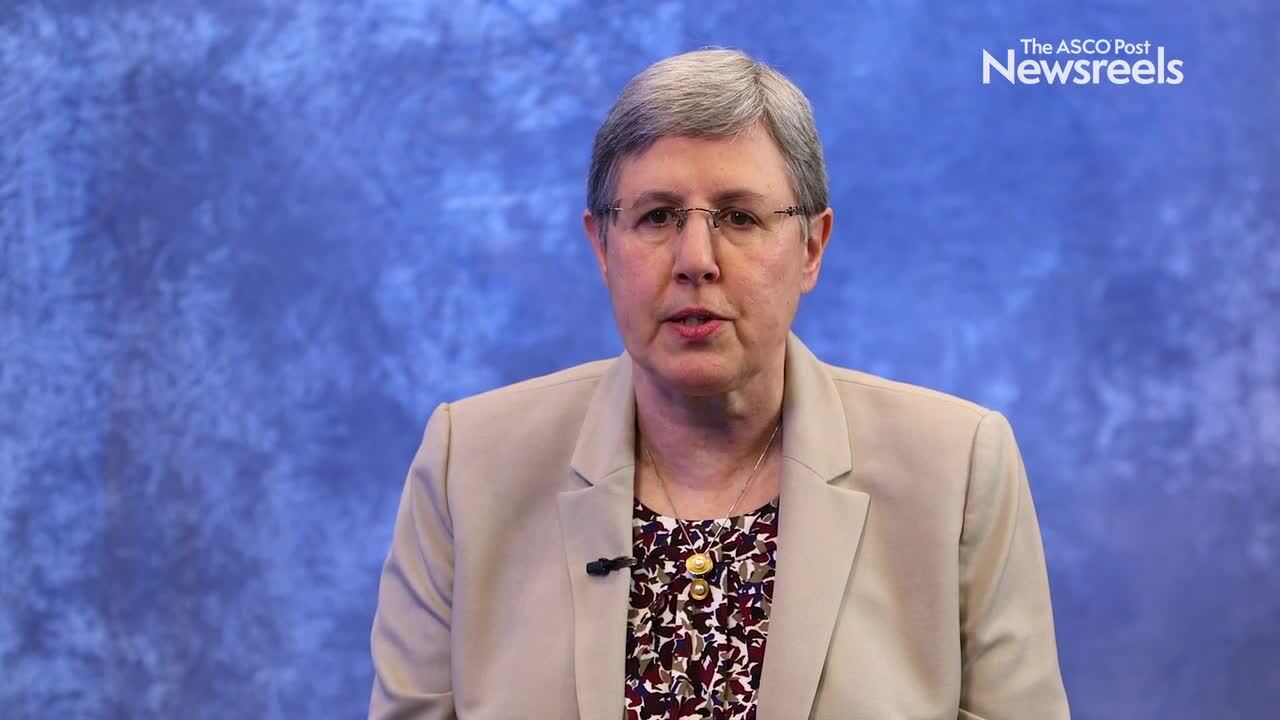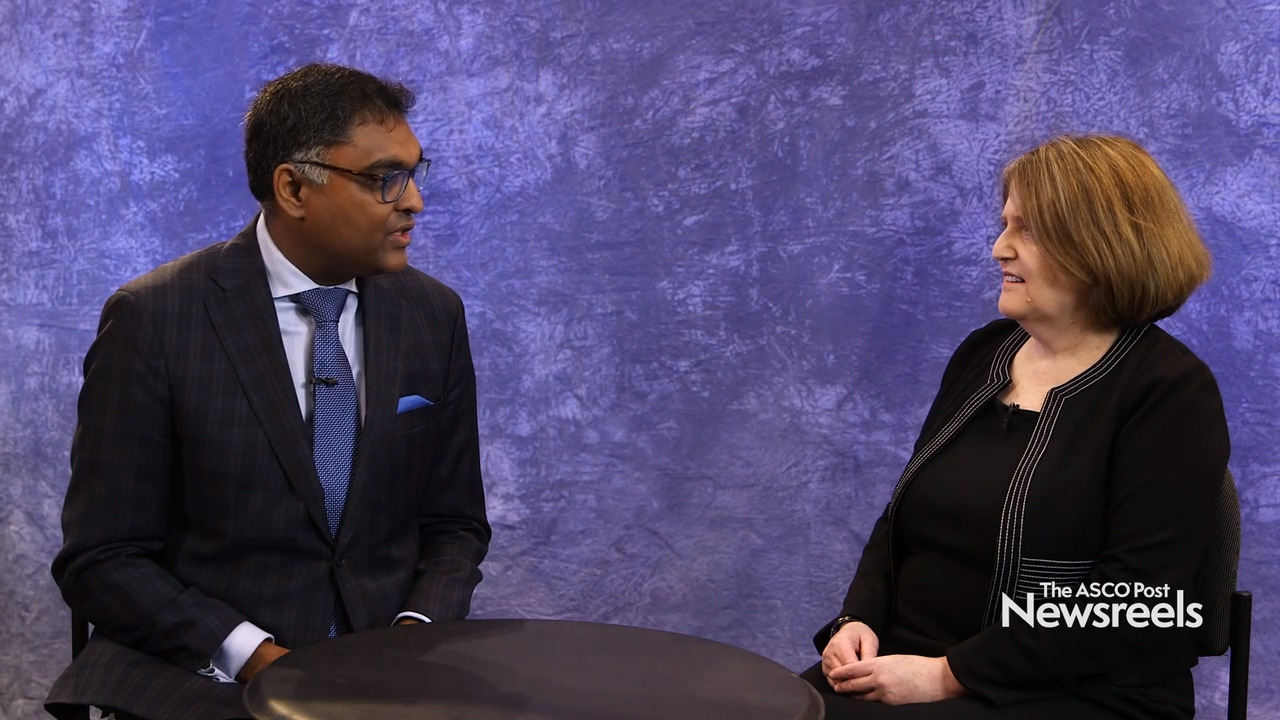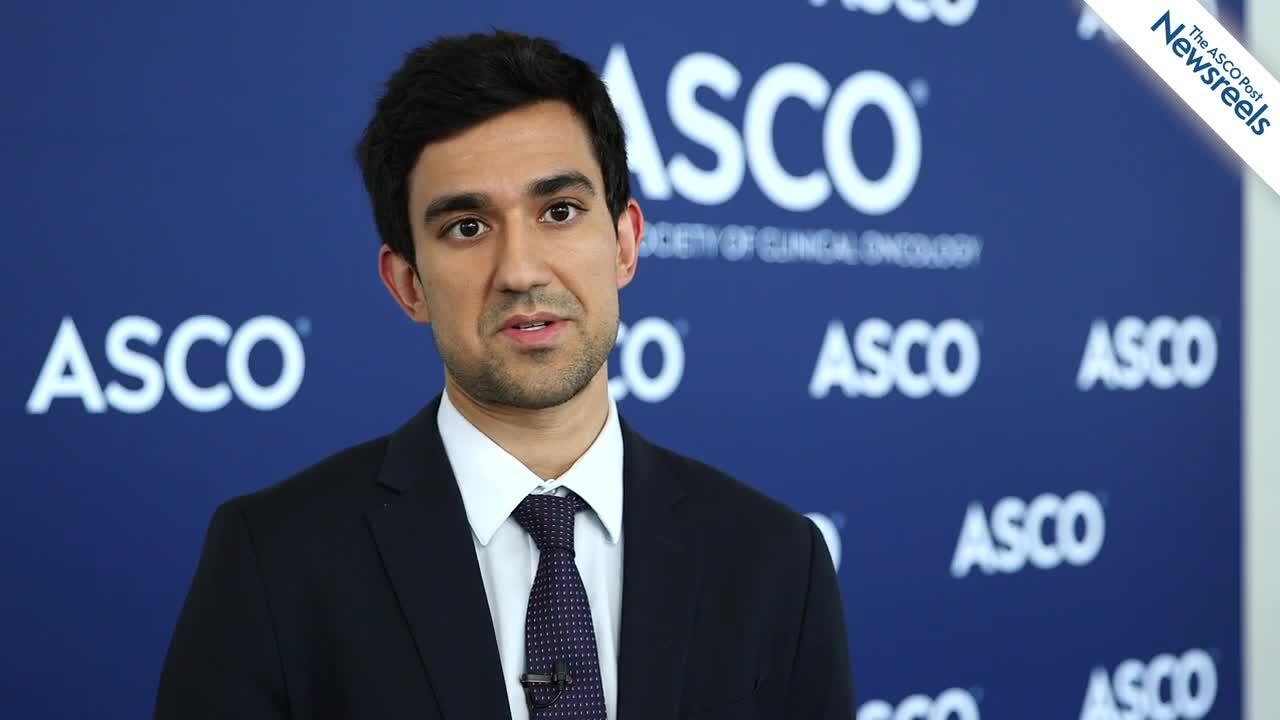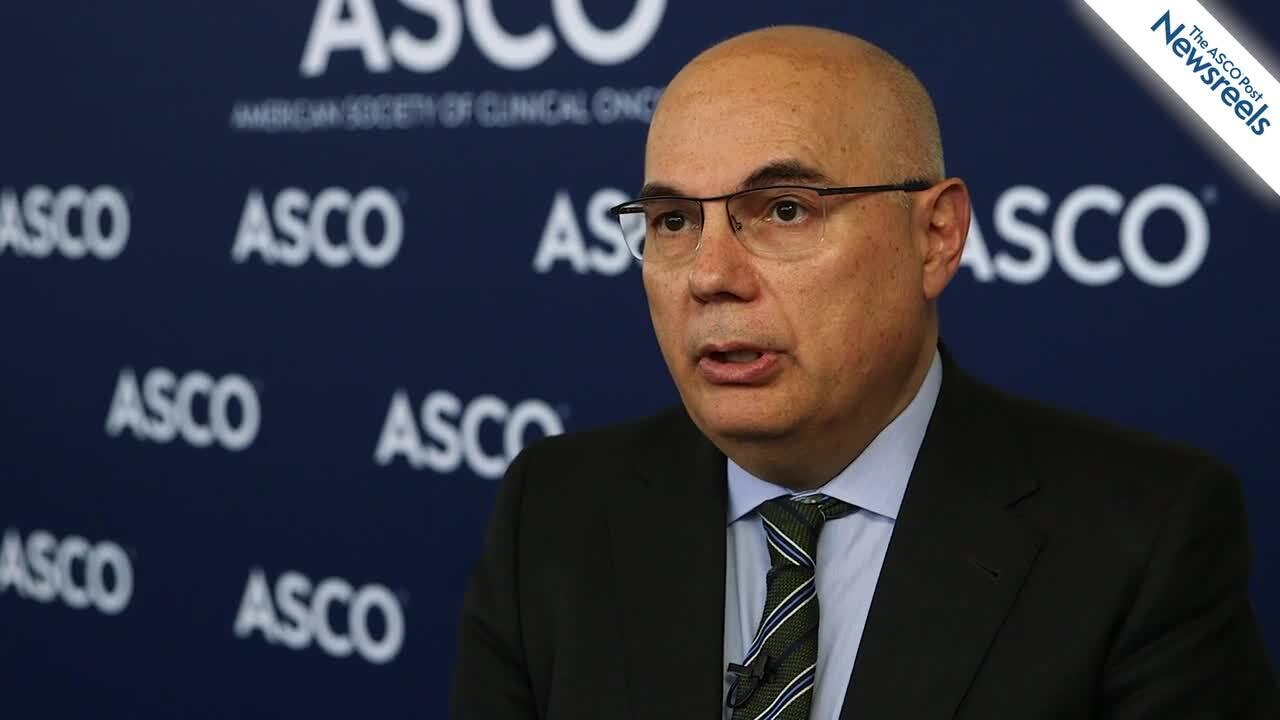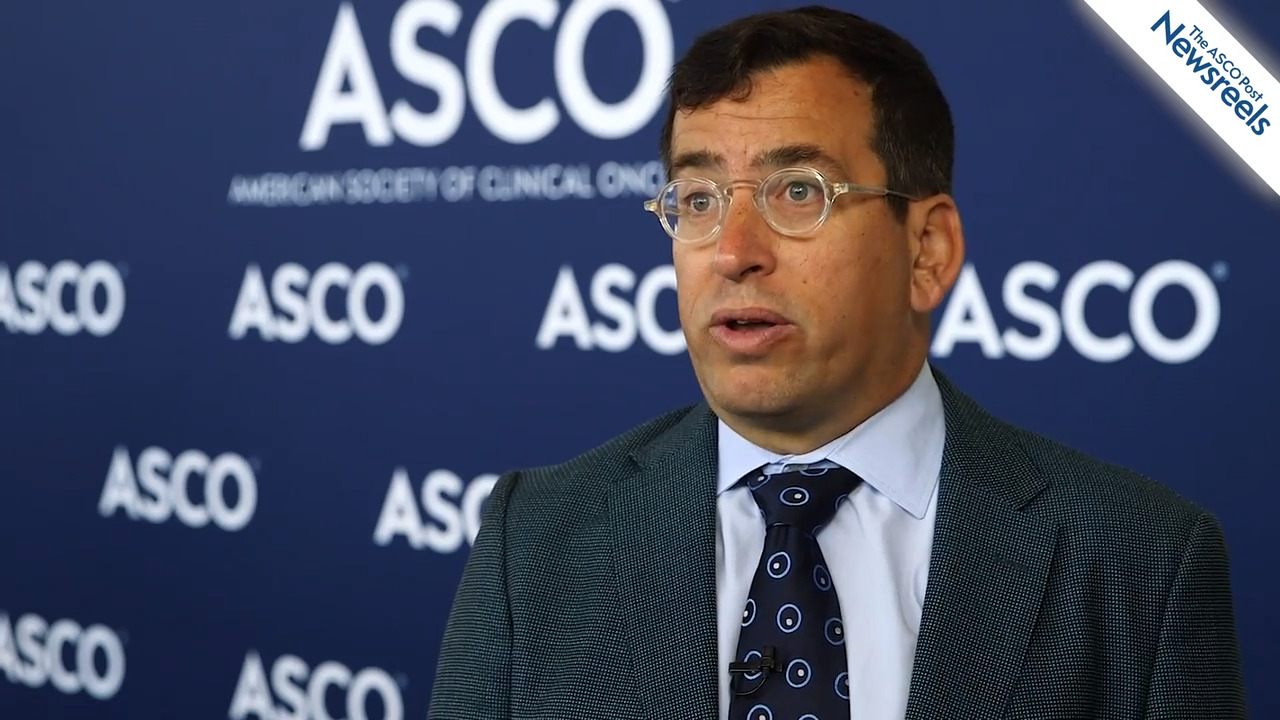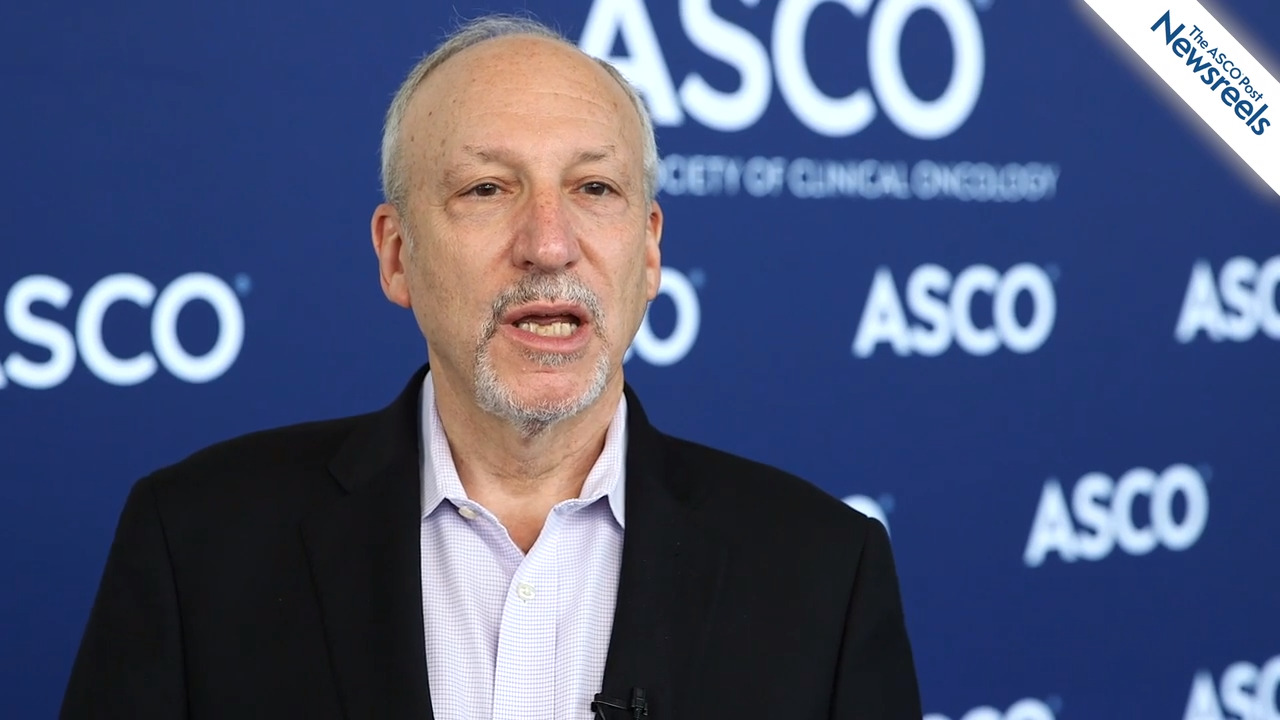2019 ASCO Annual Meeting
Michael J. Morris, MD, on Metastatic Prostate Cancer: Adding Abiraterone Acetate to Enzalutamide
Michael J. Morris, MD, of Memorial Sloan Kettering Cancer Center, discusses the phase III findings from the Alliance A031201 trial, which showed that adding abiraterone acetate to enzalutamide did not...
Brian C. Baumann, MD, on Locally Advanced Bladder Cancer: Adjuvant Radiotherapy After Radical Cystectomy
Brian C. Baumann, MD, of Washington University School of Medicine, discusses study findings suggesting postoperative radiotherapy may be an option for patients with locally advanced bladder cancer aft...
Brian C. Baumann, MD, on Locally Advanced Cancer: Proton vs Photon Therapy
Brian C. Baumann, MD, of Washington University School of Medicine, discusses study findings that showed, for adults with locally advanced cancer across five different disease sites, proton chemoradiot...
Thomas J. George, MD, on Locally Advanced Rectal Cancer: Total Neoadjuvant Therapy
Thomas J. George, MD, of NRG Oncology and The University of Florida Health Cancer Center, discusses the initial phase II results from a clinical trial using total neoadjuvant therapy (including velipa...
Patricia A. Ganz, MD, on Breast Cancer: Whole- vs Partial-Breast Irradiation
Patricia A. Ganz, MD, of NRG Oncology and Jonsson Comprehensive Cancer Center at UCLA, discusses the NRG/NSABP phase III findings, which showed that partial-breast irradiation was more convenient and ...
Sarah Abou Alaiwi, MD, and Toni K. Choueiri, MD, on Checkpoint Inhibitors: Overall Survival and Polybromo-Associated Mutations
Toni K. Choueiri, MD, and Sarah Abou Alaiwi, MD, both of Dana-Farber Cancer Institute, discuss the association of polybromo-associated BAF-type mutations with overall survival in patients with differe...
Paul G. Richardson, MD, on Relapsed or Refractory Multiple Myeloma: Adding Isatuximab to Pomalidomide and Low-Dose Dexamethasone
Paul G. Richardson, MD, of Dana-Farber Cancer Institute, discusses findings from the phase III ICARIA-MM trial showing that isatuximab, pomalidomide, and low-dose dexamethasone significantly improved ...
Miriam Knoll, MD, and Zachery Reichert, MD, PhD, on Prostate Cancer: Focal Radiation for Oligometastatic Castration-Resistant Disease
Miriam Knoll, MD, and Zachery Reichert, MD, PhD, discuss the FORCE trial, which is examining whether radiation can create a more durable response to systemic therapy, and whether using newer, more sen...
Miriam Knoll, MD, and Richard J. White, DO, on Non–Small Cell Lung Cancer: Predicting Radiotherapy/Immunotherapy Treatment Outcomes
Miriam Knoll, MD, of Hackensack University Medical Center, and Richard J. White, DO, of Allegheny Health Network, discuss improved overall survival among younger female patients with non–small cell lu...
Yoland C. Antill, MD, on Endometrial Cancer: PHAEDRA Trial on Durvalumab and Mismatch Repair Status
Yoland C. Antill, MD, of Cabrini Health, discusses phase II data on the effect of durvalumab, a PD-L1 inhibitor, as a single agent in the setting of recurrent or advanced endometrial cancer. Her resea...
Suresh S. Ramalingam, MD, on Non–Small Cell Lung Cancer: Pemetrexed, Bevacizumab, or Both as Maintenance Therapy
Suresh S. Ramalingam, MD, of Winship Cancer Institute, Emory University, discusses findings from the ECOG-ACRIN 5508 study, which showed that single-agent bevacizumab or pemetrexed is the optimal main...
Matt D. Galsky, MD, on Urothelial Cancer: Pembrolizumab vs Placebo After First-Line Chemotherapy
Matt D. Galsky, MD, of The Tisch Cancer Institute at Icahn School of Medicine at Mount Sinai, discusses phase II study findings that show switch maintenance with pembrolizumab significantly improves p...
Jonathan E. Rosenberg, MD, on Urothelial Carcinoma: Adding Bevacizumab to Gemcitabine and Cisplatin
Jonathan E. Rosenberg, MD, of Memorial Sloan Kettering Cancer Center, discusses results from the phase III Alliance trial, which showed that adding bevacizumab to gemcitabine and cisplatin did not imp...
Neeraj Agarwal, MD, and Arnaud Méjean, MD, PhD, on Renal Cancer: Cytoreductive Nephrectomy Followed by Sunitinib in the Metastatic Setting
Neeraj Agarwal, MD, of the Huntsman Cancer Institute, and Arnaud Méjean, MD, PhD, of the Hôpital Européen Georges-Pompidou, Paris Descartes University, discuss an update to the CARMENA trial with new ...
Neeraj Agarwal, MD, and Thomas Powles, MD, PhD, on Renal Cell Carcinoma: KEYNOTE-426 on First-Line Pembrolizumab Plus Axitinib vs Sunitinib
Neeraj Agarwal, MD, of Huntsman Cancer Institute, University of Utah Health Care, and Thomas Powles, MD, PhD, of Queen Mary University of London, discuss phase III study findings on outcomes with comb...
Neeraj Agarwal, MD, and Thomas W. Flaig, MD, on Muscle-Invasive Bladder Cancer: Predicting Response to Neoadjuvant Chemotherapy
Neeraj Agarwal, MD, of Huntsman Cancer Institute, University of Utah Health Care, and Thomas W. Flaig, MD, of the University of Colorado, discuss phase II findings on a novel predictive biomarker of r...
Daniel P. Petrylak, MD, on Urothelial Cancer: Enfortumab Vedotin Monotherapy for Locally Advanced or Metastatic Disease
Daniel P. Petrylak, MD, of Yale School of Medicine, discusses study results on enfortumab vedotin monotherapy for locally advanced or metastatic urothelial cancer previously treated with platinum and ...
Richard L. Schilsky, MD, and R. Donald Harvey, PharmD, BCOP, on Advanced Non–Small Cell Lung Cancer: Expanding the Criteria for Clinical Trial Eligibility
Richard L. Schilsky, MD, of ASCO, and R. Donald Harvey, PharmD, BCOP, of Winship Cancer Institute of Emory University, discuss their study findings that expanding the clinical trial eligibility criter...
2019 ASCO: Enfortumab Vedotin Shows Activity in Previously Treated, Locally Advanced or Metastatic Urothelial Cancer
The single-arm, phase II EV-201 trial showed treatment with enfortumab vedotin—an agent targeting Nectin-4, a protein found in 97% of urothelial cancers—produced responses in 44% of patien...
2019 ASCO: OSLO-COMET: Laparoscopic vs Open Resection for Colorectal Cancer Liver Metastases
The randomized Norwegian OSLO-COMET trial found that laparoscopic surgery did not change chances of survival compared to open resection to remove metastases that had spread to the liver in patients wi...
2019 ASCO: Expansion of Clinical Trial Inclusion Criteria in Patients With Advanced NSCLC
A study that examined 10,500 health records of patients with advanced non–small cell lung cancer from ASCO’s CancerLinQ database found that the use of expanded clinical trial inclusion cri...
David J. Kwiatkowski, MD, PhD, on Non–Small Cell Lung Cancer: Neoadjuvant Immunotherapy for Resectable Disease
David J. Kwiatkowski, MD, PhD, of Brigham and Women’s Hospital and Dana-Farber Cancer Institute, discusses an interim analysis and biomarker data from a multicenter study showing that 19% of patients ...
Hirotsugu Kenmotsu, MD, on Nonsquamous Non–Small Cell Lung Cancer: Pemetrexed Plus Cisplatin vs Vinorelbine Plus Cisplatin
Hirotsugu Kenmotsu, MD, of Shizuoka Cancer Center, discusses the phase III JIPANG trial findings, which showed that pemetrexed plus cisplatin was not superior to vinorelbine plus cisplatin in terms of...
Rowan T. Chlebowski, MD, PhD, on Breast Cancer Incidence and Mortality: Results From the Women’s Health Initiative on the Effects of a Low-Fat Diet
Rowan T. Chlebowski, MD, PhD, of the Los Angeles BioMedical Research Institute at Harbor-UCLA Medical Center, discusses study findings from nearly 2 decades of data, which showed a 21% reduction in de...
Karim Fizazi, MD, PhD, on the ARAMIS Trial in Prostate Cancer: Impact of Darolutamide on Pain and Quality of Life
Karim Fizazi, MD, PhD, of the Institut Gustave Roussy, University of Paris-Sud, discusses study findings showing that not only does darolutamide prolong metastasis-free survival, it maintains quality ...
Mark J. Levis, MD, PhD, on Acute Myeloid Leukemia: Gilteritinib in FLT3-Mutated Disease
Mark J. Levis, MD, PhD, of The Sidney Kimmel Comprehensive Cancer Center at Johns Hopkins University, discusses the effect of gilteritinib on survival in patients with FLT3-mutated relapsed/refractory...
Margaret A. Tempero, MD, on Pancreatic Cancer: Adjuvant Nab-paclitaxel and Gemcitabine
Margaret A. Tempero, MD, discusses phase III results from the multicenter APACT trial, which showed that adjuvant nab-paclitaxel plus gemcitabine may be an option for patients who are ineligible for t...
Taofeek Kunle Owonikoko, MD, PhD, on Small Cell Lung Cancer: Tremelimumab and Durvalumab With or Without Radiation
Taofeek Kunle Owonikoko, MD, PhD, of Emory University, discusses the findings of his phase II study, which assessed the efficacy of combined immune checkpoint inhibitors with or without radiation in r...
Danny Rischin, MD, on Head and Neck Squamous Cell Carcinoma: KEYNOTE-048 Trial on Pembrolizumab
Danny Rischin, MD, of Peter MacCallum Cancer Centre, discusses phase III results that support pembrolizumab with and without platinum-based chemotherapy plus fluorouracil as new first-line standards o...
Manmeet S. Ahluwalia, MD, on Glioblastoma: Novel Cancer Vaccine With Standard Therapy
Manmeet S. Ahluwalia, MD, of the Taussig Center Institute, Cleveland Clinic, discusses phase II findings on the efficacy and immunogenicity of SurVaxM, a novel cancer vaccine targeting the tumor-speci...
Kamal Chamoun, MD, on Multiple Myeloma: Insurance Status and Survival
Kamal Chamoun, MD, of University Hospitals Seidman Cancer Center, discusses how better insurance coverage determines not only the ability of patients with multiple myeloma to afford high-priced oral m...
2019 ASCO: POLO: Maintenance Olaparib in Germline BRCA-Mutated Pancreatic Cancer
The randomized phase III POLO trial found that maintenance therapy with the poly (ADP-ribose) polymerase inhibitor olaparib significantly delayed the progression of metastatic pancreatic cancer i...
2019 ASCO: ENZAMET: Addition of Enzalutamide to Standard of Care in Metastatic Hormone-Sensitive Prostate Cancer
An interim analysis of the international, randomized phase III ENZAMET trial found that 80% of men with metastatic hormone-sensitive prostate cancer who received the nonsteroidal antiandrogen agent en...
2019 ASCO: Medicaid Expansion and Time to Treatment in African American Patients Compared to White Patients With Cancer
Previous racial disparities in timely cancer treatment between African American and white patients were reduced in states where Medicaid access was expanded under the Affordable Care Act (ACA), accord...
2019 ASCO: Does Insurance Status Impact Survival in Patients With Multiple Myeloma?
A new study analyzing demographic statistics from the National Cancer Database presented by Chamoun et al at the 2019 ASCO Annual Meeting (Abstract LBA107) identified multiple socioeconomic factors&md...
2019 ASCO: Effect of ACA Implementation on Diagnosis and Treatment of Ovarian Cancer in Women Under 65
An analysis of data from the National Cancer Database found that after implementation of the 2010 Affordable Care Act (ACA), ovarian cancer was diagnosed and treated at an earlier stage among women yo...
Ian D. Davis, MBBS, PhD, and Christopher Sweeney, MBBS, on Prostate Cancer: ENZAMET Trial on Enzalutamide for Metastatic Hormone-Sensitive Disease
Ian D. Davis, MBBS, PhD, of Monash University and Eastern Health, and Christopher Sweeney, MBBS, of Dana-Farber Cancer Institute, discuss phase III findings from their international trial on adding en...
Amy J. Davidoff, PhD, on Racial Disparities in Time to Cancer Treatment: The Effect of Medicaid Expansion
Amy J. Davidoff, PhD, of Yale University School of Public Health, discusses study findings on how expanding access to Medicaid through the Affordable Care Act (ACA) reduced racial disparities among pa...
Alok A. Khorana, MD, and Hedy L. Kindler, MD, on Metastatic Pancreatic Cancer: POLO Trial on Olaparib as Maintenance Therapy
Alok A. Khorana, MD, of the Cleveland Clinic, and Hedy L. Kindler, MD, of The University of Chicago, discuss phase III findings on olaparib as maintenance treatment following first-line platinum-based...
Kamran A. Ahmed, MD, on Cervical Cancer: Stereotactic Body Radiation Therapy Plus Atezolizumab
Kamran A. Ahmed, MD, of the H. Lee Moffitt Cancer Center and Research Institute, reports on a trial in progress that is investigating whether treatment with atezolizumab plus hypofractionated radiatio...
Josep Tabernero, MD, PhD, on Advanced Gastric or Gastroesophageal Junction Adenocarcinoma: Pembrolizumab With or Without Chemotherapy vs Chemotherapy
Josep Tabernero, MD, PhD, of the Vall d’Hebron Institute of Oncology, discusses phase III findings of the KEYNOTE-062 study showing that, for some patients with advanced gastric or gastroesophageal ju...
Edward B. Garon, MD, on Advanced Non–Small Cell Lung Cancer: KEYNOTE-001 Trial on Pembrolizumab
Edward B. Garon, MD, of the David Geffen School of Medicine at the University of California, Los Angeles, discusses long-term survival data on patients with advanced non–small cell lung cancer treated...
2019 ASCO: Novel Immunotherapy for Recurrent, Metastatic, or Persistent Cervical Cancer
There is a high, unmet need for effective treatments for patients with recurrent, metastatic, or persistent cervical cancer—most patients are young, and survival rates are poor. Adoptive cell tr...
2019 ASCO: KEYNOTE-062: Pembrolizumab With or Without Chemotherapy vs Chemotherapy in Advanced Gastric or GEJ Adenocarcinoma
The randomized, phase III KEYNOTE-062 trial achieved its primary endpoint, showing that for patients with programmed cell death ligand 1 (PD-L1)-positive, HER2-negative, advanced gastric or gastroesop...
2019 ASCO: MONALEESA-7: Addition of Ribociclib to Endocrine Therapy in Premenopausal Women With HR-Positive, HER2-Negative Breast Cancer
The international, randomized phase III MONALEESA-7 trial found that the addition of ribociclib to standard-of-care endocrine therapy significantly improved overall survival for premenopausal women wi...
2019 ASCO: KEYNOTE-001: 5-Year Survival Data for Patients With Advanced NSCLC Treated With Pembrolizumab
Five-year data from the phase Ib KEYNOTE-001 trial showed that treatment with pembrolizumab was safe and effective and substantially increased overall survival in patients with advanced non–smal...
Lee S. Schwartzberg, MD, FACP: 2019 Update on the ACCC Immuno-Oncology Institute: Using Immunotherapy in the Community Setting
Lee S. Schwartzberg, MD, of the West Cancer Center, reports on this past year’s progress of the ACCC initiative to speed adoption of immunotherapeutics in community practices.
2019 ASCO: TITAN Study Assesses Apalutamide vs Placebo During Androgen-Deprivation Therapy for Metastatic Castration-Sensitive Prostate Cancer
Results from the phase III TITAN trial, presented by Chi et al at the 2019 ASCO Annual Meeting (Abstract 5006), showed that the addition of apalutamide to androgen-deprivation therapy (ADT) improved r...
2019 ASCO: Vincristine and Irinotecan With or Without Temozolomide in Relapsed or Refractory Rhabdomyosarcoma
In the European phase II VIT-091 trial, researchers examined the efficacy of the combination of vincristine and irinotecan with or without the addition of temozolomide in children and adults with rela...
2019 ASCO: Final Analysis of KEYNOTE-048: First-Line Pembrolizumab for Recurrent or Metastatic Head and Neck Squamous Cell Carcinoma
The phase III KEYNOTE-048 trial is examining the efficacy of pembrolizumab alone, pembrolizumab/cisplatin or carboplatin/fluorouracil (5-FU), or cetuximab/cisplatin or carboplatin/5-FU as first-line t...
